Operetta 8 Testing
FONTS
:: Use this current page grid:
:: Develop/identify OPERATTA cuts and weights to work as:
> Bodycopy for legibilty
> Display for legibility; and/or impact (headlines, pq's) (for impact consider the surrounding white space)
> Panels for opposite to body, but just as trustworty
> Furniture items (captions, credits, bylines, slugs etc)
:: Is there a Sans font that works most-excellently to support/ complement Operatta?
47 June 2023 PEOPLE | DIVERSITY
d be 18 years before she got her first female colleague, the company now employs hundreds of women – proof of just how far both the business and Saudi society have come.
Since then, women have flooded into the Kingdom’s private sector, with numbers rising exponentially in just 10 years – from 56,000 in 2010
d be 18 years before she got her first female colleague, the company now employs hundreds of women – proof of just how far both the business and Saudi society have come.
Since then, women have flooded into the Kingdom’s private sector, with numbers rising exponentially in just 10 years – from 56,000 in 2010
d be 18 years before she got her first female colleague, the company now employs hundreds of women – proof of just how far both the business and Saudi society have come.
Since then, women have flooded into the Kingdom’s private sector, with numbers rising exponentially in just 10 years – from 56,000 in 2010
d be 18 years before she got her first female colleague, the company now employs hundreds of women – proof of just how far both the business and Saudi society have come.
Since then, women have flooded into the Kingdom’s private sector, with numbers rising exponentially in just 10 years – from 56,000 in 2010
businesschief.com 48 PEOPLE | DIVERSITY

49 June 2023
Female leadership
How Saudi family businesses can be a catalyst for change
WRITTEN BY: KATE BIRCH
When in 1983, Lubna Olayan landed the CEO role in her father’s company, Olayan Financing Co., part of a huge multinational conglomerate in Saudi Arabia, she became the first female leader of a large family business in the country.
And while it would be 18 years before she got her first female colleague, the company now employs hundreds of women – proof of just how far both the business and Saudi society have come.
Since then, women have flooded into the Kingdom’s private sector, with numbers rising exponentially in just 10 years – from 56,000 in 2010 to a staggering 935,508 in 2021.
The Saudi government has led the way with gender reforms, the most impactful of which was outlined in 2017 in Vision 2030, to increase female participation in the workforce to 30%. That target was reached and smashed last year (2022), climbing to 37% female participation.
Among other impactful initiatives is the government-led Women’s Support Fund, which offers employer support in covering a certain percentage of women’s salaries.
businesschief.com 50
Family businesses are uniquely positioned to create opportunities for women to advance in business more quickly, making them a torchbearer for change in Saudi Arabia
But just as the government is an important facilitator for wide-scale change in the Kingdom, so too family businesses have a key role to play in supporting women’s progress – especially given that they make up 64% of private-sector companies, employ 52% of the population, and contribute 32% to the Kingdom’s GDP.

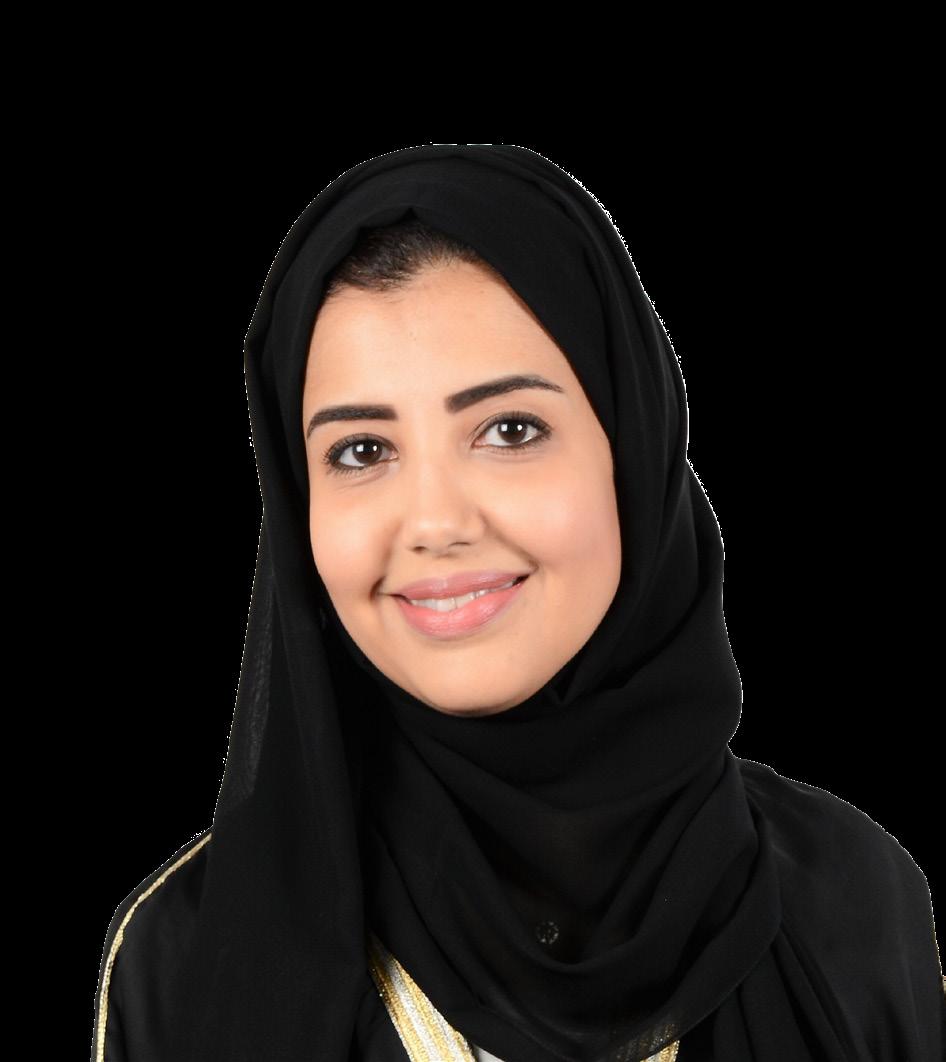
Advancement of women in family businesses
The fact is, because of the family dynamics, these businesses are uniquely positioned to create opportunities for women to advance more quickly. Unlike in other companies, where women may feel shut out of the conversation for
51 June 2023
“Family businesses have an important role to play in being torch bearers for change”
Kholoud Mousa Partner and Head of DEI, KPMG Saudi Arabia
leadership roles, women in family enterprises can use their family status to help vouch for themselves.
“Family businesses give women a unique opportunity and entry point because a woman enters business to explore her strength, leverage, sense of purpose and passion,” says Lynne Fleifel, VP for Sustainability and Diversity at Olayan Saudi Holding Company.
“It’s unique for family businesses and what they can offer women. Both men and women enter the business with an equal claim to succession.”
Of course, it hasn’t always been this way, with Saudi family businesses traditionally taking the ’premiogeniture’ approach of transferring the company from the father to the first-born child and, often, the first-born son.
But increasingly, forward-thinking enterprises are transitioning to a merit-based or objective approach to succession, according to KPMG Saudi Arabia’s The Power of Women in Family Business report, which features insights from 14 female family business leaders in the country.
Olayan Group, the Saudi conglomerate to which Lynne belongs, is a pioneer on this front.
“When my grandfather started the business, he laid out a clear path for men and women family members’ succession based on 100% meritocracy and equal opportunity, pay and promotion.”
Because of this, Lynne says she grew up in a company where you don’t think about men and women’s issues because it is distracting, and where many women hold senior leadership roles, including herself and Lubna Olayan, who was CEO of OFC for 35 years.
Kholoud Mousa, Partner and Head of Inclusion, Diversity and Equity at KPMG Saudi Arabia, tells Business Chief that “family businesses have an important role to play in being torchbearers for change”.
Gender quotas: yes or no?
Gender quotas are used by many countries and companies to help rectify women’s under-representation, especially on boards or in senior roles. While neighbouring country the UAE introduced a quota in 2021, requiring every listed board to have at least one female representation, Saudi Arabia is yet to take this route. But should they?
Putting in place female representation quotas can create greater awareness of bias and stereotypes and can be a starting point in countries where gender equality is not yet a cultural norm, yet many of the female leaders interviewed in KPMG’s women in family business report said they weren’t in favour of forcing rules and programmess on to companies.
But looking at women’s lack of representation in the C-Suite and on boards in Saudi, Kholoud Mousa, Head of DEI at KPMG Saudi Arabia, argues that some measures such as the implementation of quotas are required to enforce change.
Khlood Aldakheil, CEO of family-run Erteqa Financial Company, concurs. “A quota secures diversity not only genderwise, but also in other aspects. It is a corrective tool. It’s a medicine that might hurt but will ensure your survival.”
Quotas put in place in the Kingdom for Saudization, a nation-wide objective to increase the number of employed Saudi citizens, is proof that quotas can work in Kingdom. “To better integrate women
businesschief.com 52 PEOPLE | DIVERSITY
READ THE FULL STORY
Diversity in family business crucial for survival
There is no longer any question about diversity being good for business. Study after study has shown that diversity leads to more creative teams and increases a firm’s bottom line. And numerous studies show that firms with more women in senior positions are more profitable, more socially responsible and provide higher-quality customer experiences.
According to PwC’s latest Global Family Survey, which polled 46 family businesses in the Middle East, enterprises with more diverse boards (those with two or more women, one member under the age of 40, one non-family member, and one from a different sector) tend to be more progressive and advanced in areas such as contributing solutions to society, the environment, and DEI – all areas linked to stronger financial performance.
“Ample evidence points to the fact that diverse and inclusive companies with gender equality throughout the organisation and women represented in the C-Suite and boardrooms are likely to be more aligned with ESG priorities,”
Kholoud Mousa, Partner and Head of Inclusion, Diversity and Equity at KPMG Saudi Arabia, tells Business Chief.

According to Kholoud, women make better and more sustainable decisions to innovate, and so gain a competitive edge increasing their profitability and
More women entering leadership positions at family businesses normalises the idea of having women in C-suite roles, which in turn creates an environment that will spread into non-family businesses and open the door for other women to assume leadership positions, she explains.
Khlood Aldukheil, who has more than 20 years of financial advisory and investment banking experience and is CEO of familyrun Erteqa Financial Company, has seen this normalisation work first-hand – in the Kingdom’s banking sector.
Banks started hiring a significant number of women before any other industry in the private sector, she says. After the initial wave of hiring, women being present in the office and being active on deals and projects became normalised.
53 June 2023 PEOPLE | DIVERSITY
READ THE FULL STORY
Once that happened, people in the industry started judging their peers based on their performance rather than their gender.
Normalising women in leadership
Dr Basma and Nouf Al Zamil, both senior leaders at Zamil Group Holding Company, further attest to the power of family business in powering normalisation.
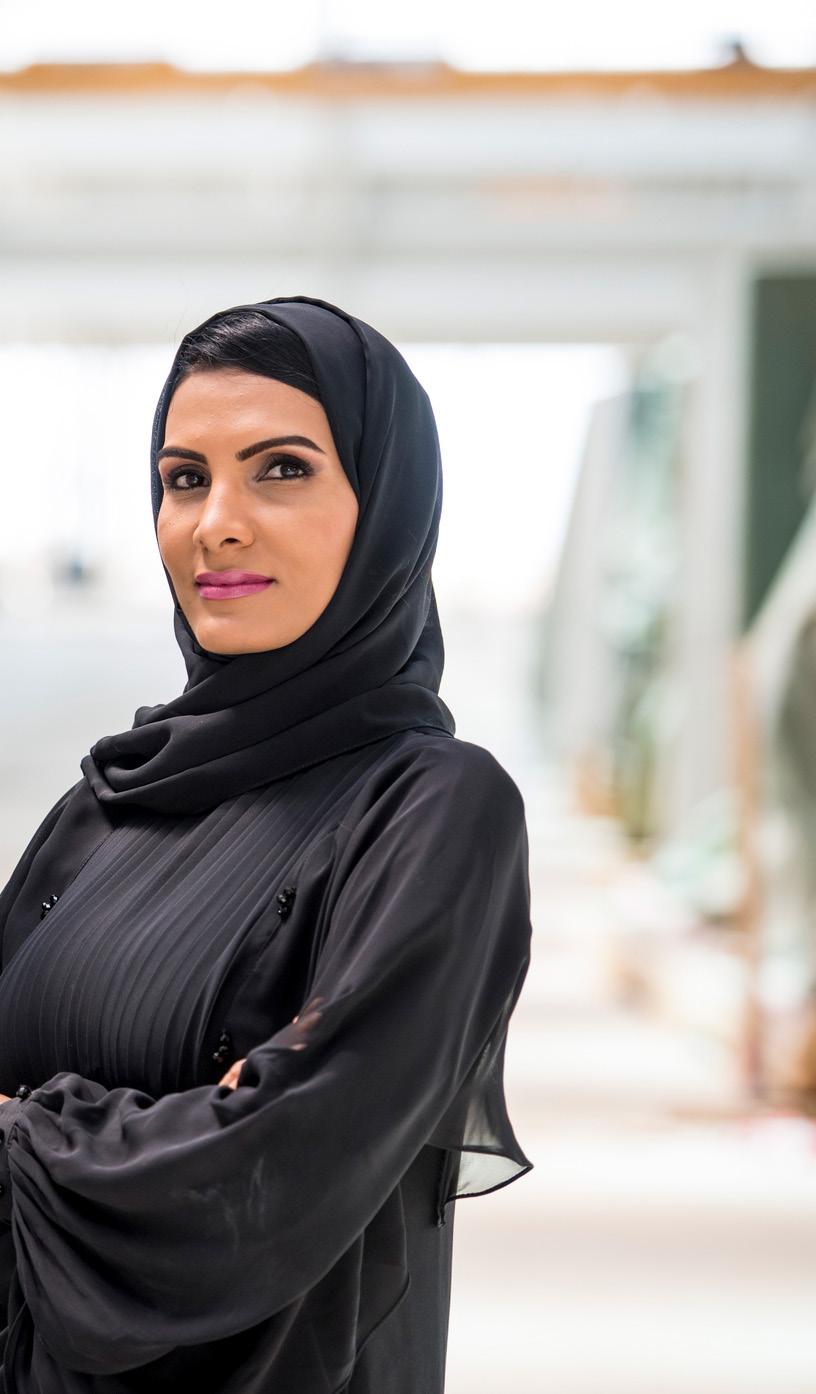
As members of the third generation in the Zamil Group Holding Company, a centuryold family-run Saudi business operating in traditionally male-dominated industries like manufacturing, construction and real estate, the cousins were the first women to join the company, in 2011 – trailblazing not just for their family but for future Saudi generations.
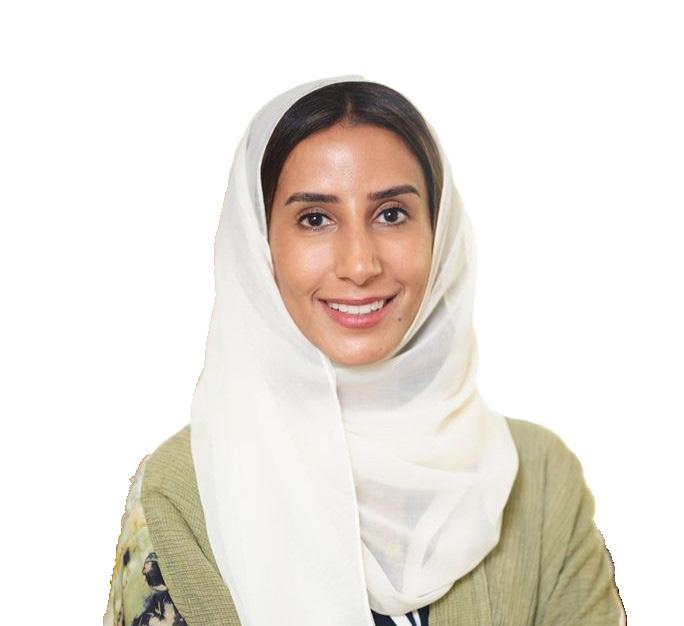
Like all family members, they began working in the business’s factories and plants, before taking an active role in hiring women to fill the food factory floor at Zamil Food Industries. This saw Zamil become the first company to have women working in factories in Saudi Arabia and soon pushed other companies across the Kingdom to follow suit.
Dr Basma says that in the beginning people couldn’t believe they were hiring women to work on factory floor, but now other companies are hiring women for similar positions.
“They are not hiring them just because they are females – they believe they can deliver better than men, especially in certain jobs,” says Basma, who has worked her way up to HR leader.
As trailblazers for their family, the company, and society at large, Basma and Nouf are happy to see women join the company from the fourth generation but are keen to limit the sense of entitlement felt by family members.
“They can’t just get a job because they are a family member,” says Nouf, who has been
businesschief.com 54
READ THE FULL STORY
“They cannot just get a job because they are a family member. We are cascading this value down, so as to demolish entitlement. If you work hard, you will get rewarded”
Nouf Al Zamil Director of Corporate Communications and ICT, Zamil Group Holding Company
Meet the woman connecting female leaders in the Middle East
WRITTEN BY: KATE BIRCH
Founder of WILD, the first professional network to connect women across the Middle East, and the first in Saudi, Emma Burdett is trailblazing gender equality
Bullied, fired, harassed, manipulated, belittled. There isn’t much Emma Burdett hasn’t endured while working in the corporate sector –from vindictive female bosses to ego-driven male bullies, intimidated by confidence and potential.
Toxic workplace cultures are widespread. A recent survey from the McKinsey Health Institute reported more than half (55%) of people in the Middle East endured a toxic workplace.
“I had a male boss demote me, belittle me, forge sales figures and assign me low producing regions so I would fail,” says Emma, who has worked in various male-dominated sectors, including real estate and construction, both of which remain so today.
It’s one of the reasons Dubai-based Emma created WILD Women Collective, a network dedicated to supporting women, helping them implement boundaries and ultimately providing them with a safe space where they can be ’seen’ and ’heard’.
It was in 2018, following a mental breakdown brought on by burnout, that Emma decided
to start WILD with just US$300, officially launching in Dubai in mid-January this year, before unveiling the concept in Saudi Arabia and then Abu Dhabi.
Emma, who is a transformational coach and gender equality specialist, tells Business Chief that what originally started as four women sat around a table with a sheet of paper has since become a “staple, vibrant and integral network within the UAE and Saudi with plans of scaling across other GCC locations and Middle East countries and to launch WILD UK.”
While the WILD Women Collective isn’t the first female professional networking group in Dubai – that title goes to two decade-old Dubai Business Women Council, founded by Dr Raja Al Gurg – it is the first and only network to connect women across the Middle East and the first to launch in Saudi Arabia.
“We are trailblazing gender equality,” Emma says. “Our membership gives women everything they need to create happiness, success, and fulfilment both in and out of the workplace.
“WILD is a movement I am proud to pioneer.”
55 June 2023

businesschief.com 56
“WILD is a movement I am proud to pioneer”
3 more networking groups for women in the UAE
Dubai Business Women Council
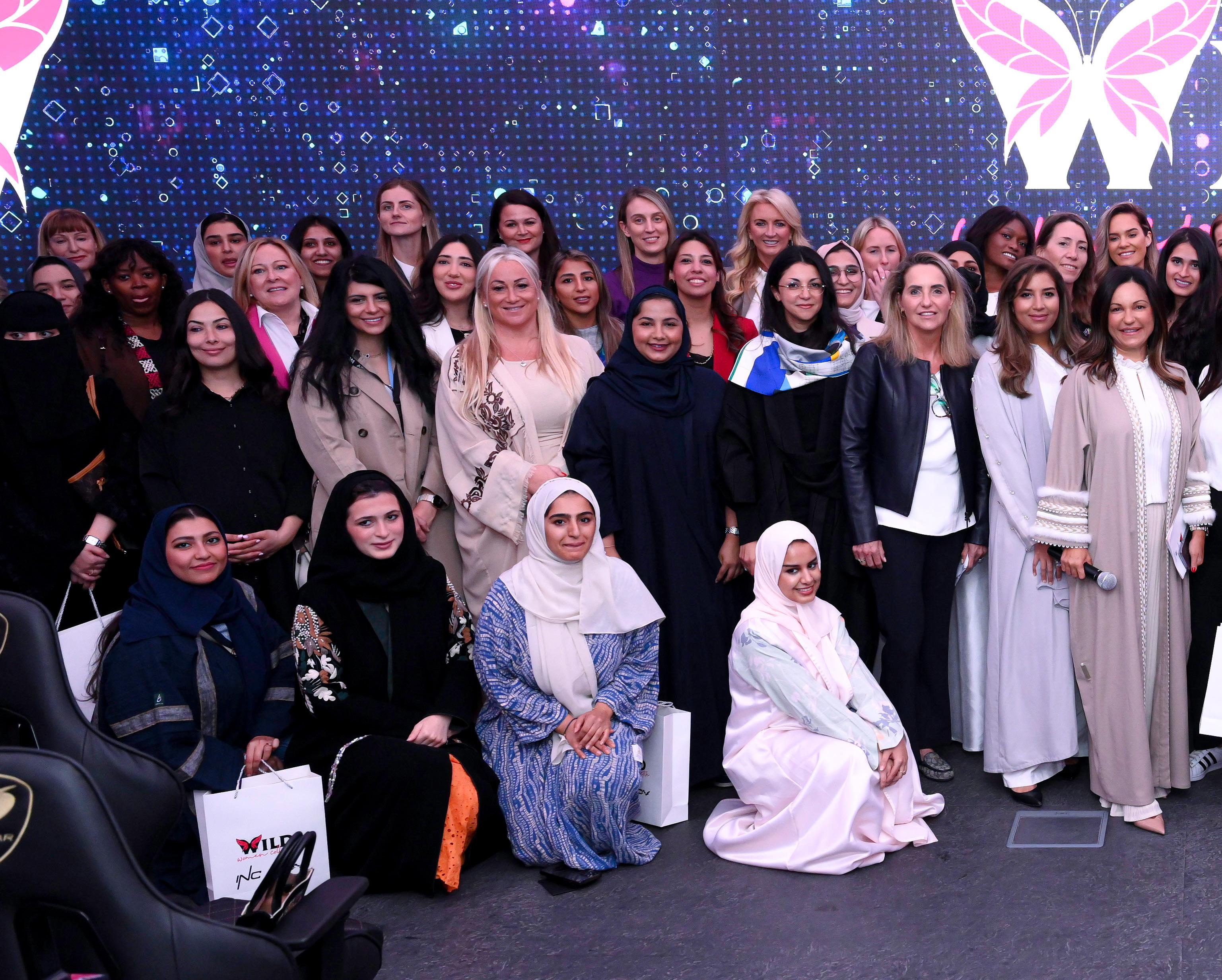
Founded more than 20 years ago by Dr Raja Al Gurg, Chairperson and MD of the Easa Saleh Al Gurg Group, DBWC is the UAE’s leading platform for the personal and professional development of businesswomen in the UAE, providing education, training and networking opportunities. DBWC’s tailored workshops and seminars for members offer training in valuable skills and best practices.
Female Fusion
Founded by Dubai-based entrepreneur Jen Blandos, Female Fusion is the UAE’s largest and most engaged community for womenowned businesses, for female entrepreneurs who want to start, build, grow, and scale.
Members receive masterclasses, workshops, monthly UAE-based meetups and events, and discounts on business-critical services. Membership is waitlisted until September.
The Bureau
Recently co-founded by Dubai-raised sisters Nikita and Rhea Patel, The Bureau is the UAE’s first purpose-build female-focused co-working space – think meeting rooms, co-working lounges, phone booths, podcast studio, fitness studio and pumping room. The Bureau provides purposeful networking, with regular events and mentorship programmes, including industry-specific matches, and a regular series of talks on everything from financial empowerment to mental health.
57 June 2023
WILD – supporting wellness as much as ambition
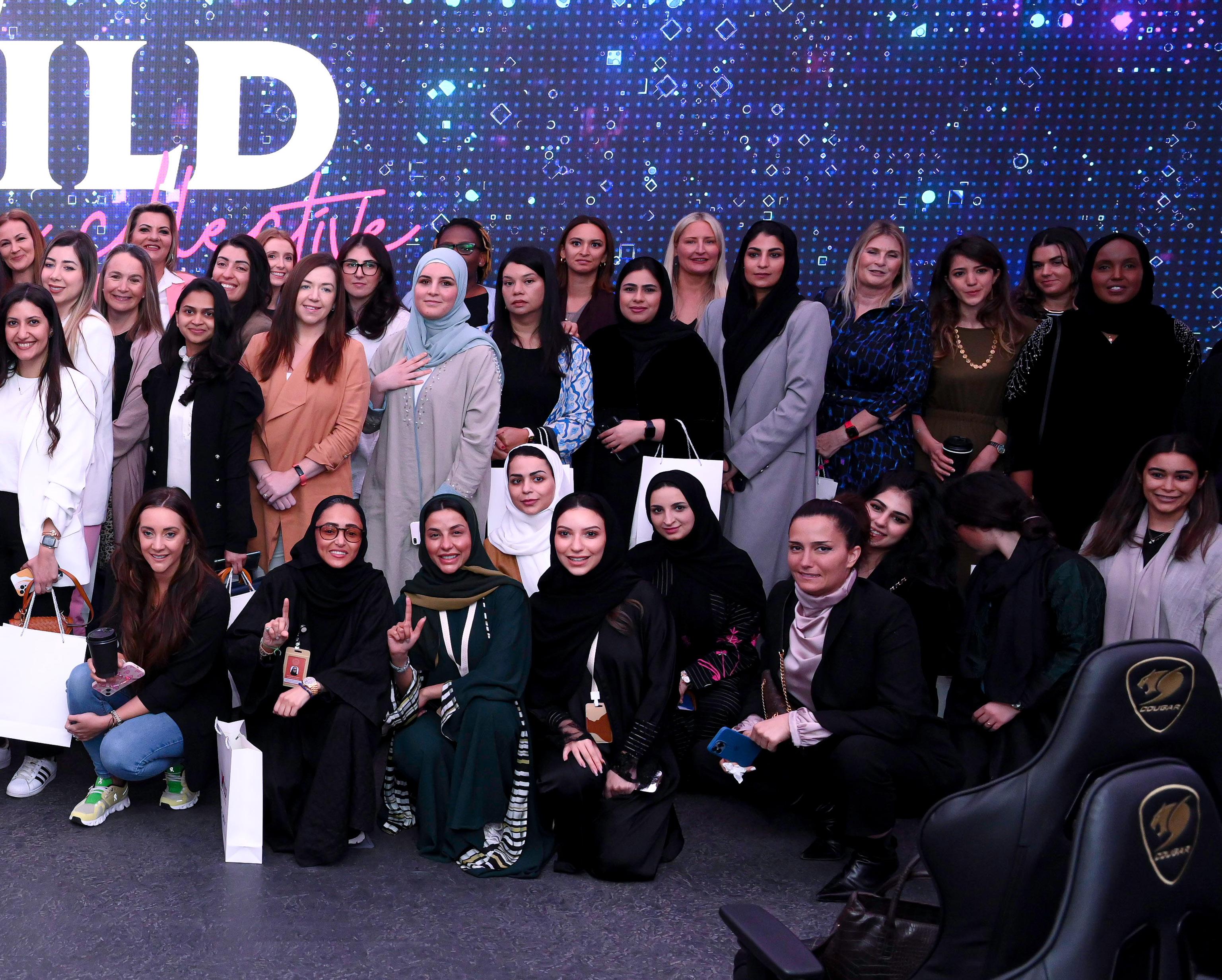
For Emma, who has seen the impact of burnout first-hand, it was important that WILD be as much about wellbeing as it is about striving for success.
“Burnout is real and serious,” declares Emma, and “something I see often with women… as they work tirelessly to prove they are as strong, dedicated and just as committed and ambitious as men.”
Society continues to reward the ’hustle’, the pushing and striving, something Emma argues is an “outdated and backward concept” and one that needs to change. “What we should be encouraging is creating space for ourselves and putting our health and wellbeing at the top of the agenda.”
And research backs this up, with one-third of employees in GCC countries reporting burnout symptoms, and more than 60% reporting symptoms of poor mental health and wellbeing, McKinsey Health Institute finds.
The level of employees experiencing distress, often a precursor to burnout, was also higher in the GCC than globally, with 55% reporting it compared to 32% globally.
And such burnout is often driven by toxic behaviour at work. GCC employees reporting high levels of toxic behaviour at work are seven times more likely to experience burnout –something Emma has herself experienced and is focused on tackling with WILD.
businesschief.com 58
READ THE FULL STORY
PEOPLE | DIVERSITY
Emma Burdett launched WILD Women Collective in Saudi Arabia earlier this year
Testing body weights
Bullied, fired, harassed, manipulated, belittled. There isn’t much Emma Burdett hasn’t endured while working in the corporate sector –from vindictive female bosses to ego-driven male bullies, intimidated by confidence and potential.
Toxic workplace cultures are widespread. A recent survey from the McKinsey Health Institute reported more than half (55%) of people in the Middle East endured a toxic workplace.
“I had a male boss demote me, belittle me, forge sales figures and assign me low producing regions so I would fail,” says Emma, who has worked in various male-dominated sectors, including real estate and construction, both of which remain so today.
It’s one of the reasons Dubai-based Emma created WILD Women Collective, a network dedicated to supporting women, helping them implement boundaries and ultimately providing them with a safe space where they can be ’seen’ and ’heard’.
It was in 2018, following a mental breakdown brought on by burnout, that Emma decided
to start WILD with just US$300, officially launching in Dubai in mid-January this year, before unveiling the concept in Saudi Arabia and then Abu Dhabi.
Emma, who is a transformational coach and gender equality specialist, tells Business Chief that what originally started as four women sat around a table with a sheet of paper has since become a “staple, vibrant and integral network within the UAE and Saudi with plans of scaling across other GCC locations and Middle East countries and to launch WILD UK.”
While the WILD Women Collective isn’t the first female professional networking group in Dubai – that title goes to two decade-old Dubai Business Women Council, founded by Dr Raja Al Gurg – it is the first and only network to connect women across the Middle East and the first to launch in Saudi Arabia.
“We are trailblazing gender equality,” Emma says. “Our membership gives women everything they need to create happiness, success, and fulfilment both in and out of the workplace.
“WILD is a movement I am proud to pioneer.”
59 June 2023
LIGHT REGULAR
to start WILD with just US$300, officially launching in Dubai in mid-January this year, before unveiling the concept in Saudi Arabia and then Abu Dhabi.
Emma, who is a transformational coach and gender equality specialist, tells Business Chief that what originally started as four women sat around a table with a sheet of paper has since become a “staple, vibrant and integral network within the UAE and Saudi with plans of scaling across other GCC locations and Middle East countries and to launch WILD UK.”
While the WILD Women Collective isn’t the first female professional networking group in Dubai – that title goes to two decade-old Dubai Business Women Council, founded by Dr Raja Al Gurg – it is the first and only network to connect women across the Middle East and the first to launch in Saudi Arabia.
“We are trailblazing gender equality,” Emma says. “Our membership gives women everything they need to create happiness, success, and fulfilment both in and out of the workplace.
“WILD is a movement I am proud to pioneer.”
Rotunda for boxout copy?
Gender quotas are used by many countries and companies to help rectify women’s under-representation, especially on boards or in senior roles. While neighbouring country the UAE introduced a quota in 2021, requiring every listed board to have at least one female representation, Saudi Arabia is yet to take this route. But should they?
Putting in place female representation quotas can create greater awareness of bias and stereotypes and can be a starting point in countries where gender equality is not yet a cultural norm, yet many of the female leaders interviewed in KPMG’s women in family business report said they weren’t in favour of forcing rules and programmess on to companies.
But looking at women’s lack of representation in the C-Suite and on boards in Saudi, Kholoud Mousa, Head of DEI at KPMG Saudi Arabia, argues that some measures such as the implementation of quotas are required to enforce change.
Khlood Aldakheil, CEO of family-run Erteqa Financial Company, concurs. “A quota secures diversity not only genderwise, but also in other aspects. It is a corrective tool. It’s a medicine that might hurt but will ensure your survival.”
Quotas put in place in the Kingdom for Saudization, a nation-wide objective to increase the number of employed
PEOPLE | DIVERSITY
businesschief.com 60
READ THE FULL STORY
MEDIUM









